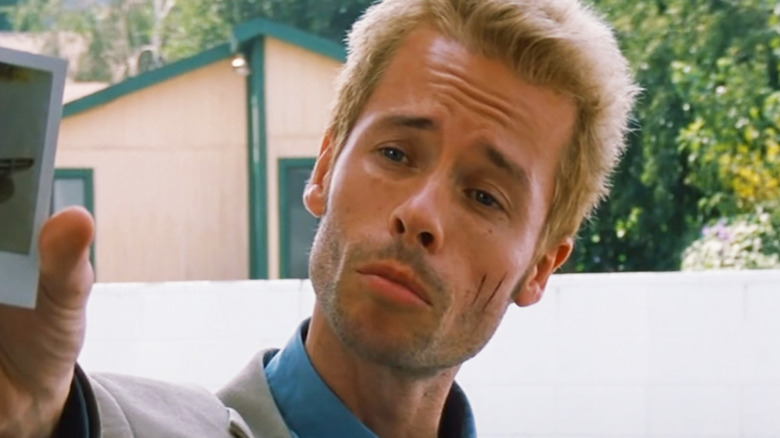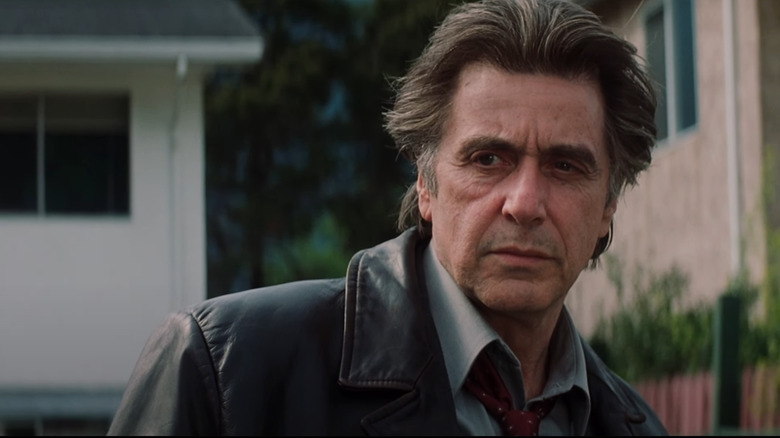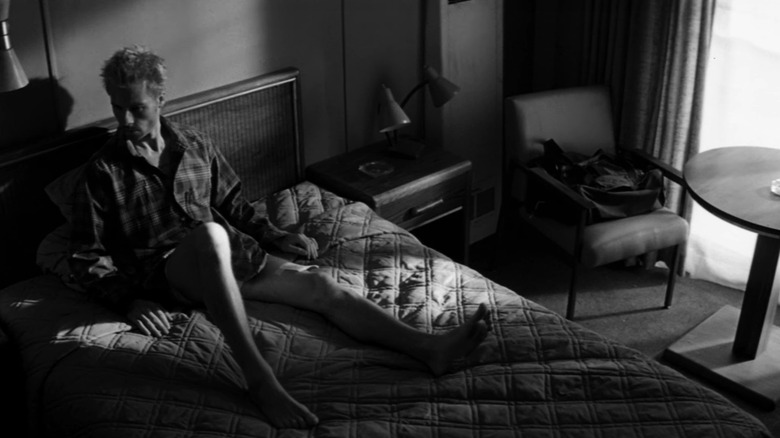Christopher Nolan's Insomnia Was Never Meant To Be A 'Follow-Up' To Memento
This post contains spoilers for "Insomnia"
Love him or hate him, Christopher Nolan is fascinating if only for being a bit of a contradiction. His films are known for their mind-bending narratives, unusually deep philosophical ruminations, and for generally trying to push the art of filmmaking beyond what you'd typically see in the mainstream. But for all his progressive ambitions, Nolan has always respected many of the industry's more traditional techniques, such as shooting on film and avoiding CGI in favor of practical effects whenever possible.
Hey, you can only break the rules well if you know what they are, and that's exactly the case with Nolan. Having skipped a film school education, the British auteur had to teach himself all the elements that go into making a film, becoming intimately familiar with them all. This led to what he called in a DGA interview a "very organic approach to understanding all the different bits of the craft," which clearly contributed to his appreciation for conventional filmmaking methods. As Nolan pointed out, he was "a member of probably the last generation who cut film on a Steenbeck flatbed."
With all the basics down, the budding director set about subverting most of them with his breakout movie, the 2000 independent film "Memento." This Guy Pearce-led effort had all the unorthodox elements that would become standard in future Nolan movies: an original idea shot on film with a non-linear narrative and plenty of twists and turns. The young director had caused quite a stir with his inventive $4 million movie, and naturally, everyone was excited to see what he came up with next. Oddly, when the follow-up did arrive it wasn't anything like "Memento." In fact, if you ask Nolan, it wasn't even really a follow-up at all.
An 'evocative psychological situation'
For his first studio project, Nolan joined up with Warner Bros. for the 2002 crime thriller "Insomnia." A remake of a 1997 Norwegian movie, the film starred Al Pacino as LA detective Will Dormer, who travels to Nightmute, Alaska to help investigate the murder of a teenage girl. Dormer, who's under Internal Affairs investigation himself for his conduct on previous cases, zeroes in on the murderer, Walter Finch, played by Robin Williams who was at the time in full 'dramatic role' mode, having also starred as loner photo technician Seymour Parrish in "One Hour Photo" that same year.
And while the film had similarities to "Memento" with its similarly unreliable narrator who begins to question his own mental processes, "Insomnia" was a much more conventional movie. In fact, it remains Nolan's most conventional film 20 years later. Considering the director's love for detective fiction it makes sense that he would be drawn to the crime thriller, especially considering it contained what he called (via MovieWeb) a "fascinating and very evocative psychological situation." But it still stands out as a remarkably non-Nolan-esque entry in the director's filmography, and a departure from the creative filmmaking of "Memento."
Perhaps that's why Nolan doesn't really see it as a true follow-up to his breakout film. Asked about why he chose "Insomnia" after having such success with "Memento" he said:
"To be honest I started work on Insomnia some months before 'Memento' was even released in theaters, so I wasn't really having to view 'Insomnia' necessarily as a follow-up in the sense that people would question it because no one really knew the extent 'Memento' would get out there at the time. I thought I should be free to do whatever inspired me and took my fancy. I found the original movie very inspiring."
Insomnia was Nolan proving himself
Much of why "Insomnia" feels like a more traditional film than its predecessor is likely down to the fact Nolan was not only adapting an existing work, but that he was under more pressure than with "Memento." Sure, the 2000 film was his first time spending other people's money so there was pressure there. But he was working on an original idea and had only his vision to refer to. "Insomnia" sounds like a much more hectic and pressurized situation.
Whereas Nolan and his cast and crew rehearsed "Memento" fairly extensively, Pacino said that they didn't have time to do that with "Insomnia," so the typically well-prepared Nolan was immediately shooting in a different mode to that of his previous effort. In fact, the director spoke about making "an advantage out of the pressure we were under" on the film and basically rehearsing scenes on-site while filming.
But what's interesting is that when Nolan speaks about "Insomnia," he doesn't see it as all that different from his other work. He's previously said that regardless of what movie he's making, "the process itself has always been fundamentally the same: You stand there and look at what the scene is going to be and then everything else falls away." In that sense, the director has always been insightful enough to not interject his own sensibilities where they're not needed. In the case of "Insomnia," he knew he was somewhat beholden to the original film, and showed some tasteful restraint in directing it the way he did. Some critics might argue that restraint wouldn't go amiss in his more recent movies, but Nolan has long since proven he knows his fundamentals so what's the fun in sticking to the rules if you're so good at breaking them?


